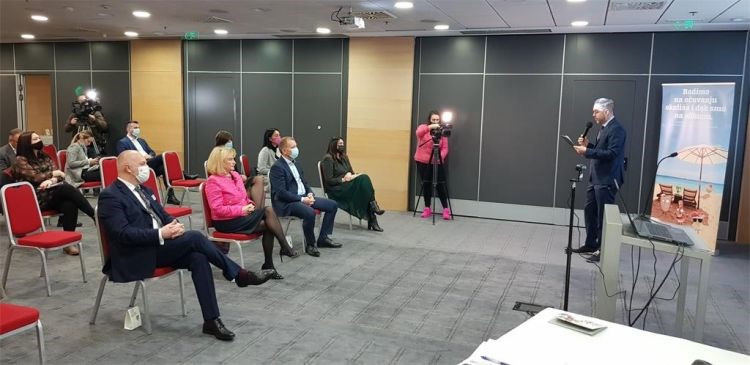- Published: 16.12.2021.
The hotel handbook „Reduce food waste, cook for your guests” was presented
Hotel Osijek presented the results of the pilot project of the Fund „Reduce food waste, cook for your guests”, and a handbook for hotels - a valuable tool that will help reduce food waste. The pilot project was initiated in two Croatian hotels - Osijek and Pula, and it aims to implement work methods in hotel kitchens that will help reduce food waste.
So far, workshops have been held for hotel employees and measurements have been carried out, the results of which were presented today at the Hotel Osijek in Osijek.“You know that The Environmental Protection and Energy Efficiency Fund have been implementing projects in the field of waste management for many years, and one of such projects is Reduce food waste, cook for your guests, which we started six months ago. Croatia’s duty is to separately collect 40% of the produced biowaste mass until 2022, and that includes food waste, which is the focus of this pilot project. Today, we are here to present the results of the project and, which is very important - a handbook for hotel-managers that offers guidelines, recommendations and methods that affect food waste reduction and will lead to reduced disposal of biowaste on landfills, which is one of our main goals” said the deputy manager Alenka Košiša Čičin-Šain.
"Today we presented the results of two measurements of the amount of waste in two hotels - hotel Osijek and Park Plaza Histria in Pula. We should emphasise that hotel Osijek managed to reduce the amount of waste thanks to our recommendations and consultations we offered to the hotel staff. We started by measuring the total amount of food waste in 10 categories, and we divided them to meat, eggs, bread, milk and dairy products. We established the reduction of the amount of bread, up to 50% since the initial measurement. The result was also achieved thanks to smaller plates that hotel Osijek serves next to the big ones so that guests can choose and fill their plates with the amount of food they can actually eat. The goal is not to deny guests of the amount of food they would consume, but to prevent throwing away food that will remain on the plate” clarified the leader of the EU Project Implementation Services and pilot-project coordinator Vesna Cetin Krnjević from the Fund.
The director of hotel Osijek Sandra Đurđević expressed satisfaction with the food reduction that so far reached 11%. “Our goal was to measure the amount of waste we produce and implement measures that we created together in order to reduce that waste.”
Support for the pilot project was expressed by the President of the City Council of Osijek Vladimir Ham who referred to current times when people have no access to food, while on the other hand modern societies create enormous surpluses and food becomes a problem instead of a necessity. “In the last few years, Osijek has become one of the leaders in separating and managing waste, and that also refers to the separation of biowaste.”
Croatian tourism played a key role in this story because it is more and more focused on sustainability, and the General for Sustainable Development and Competitiveness of Tourist Destinations at Ministry of Tourism and Sport Slavko Štefičar talked about that subject too. “Most of the food served, especially during the season when the number of guests increases significantly, results in copious amounts of waste, which we certainly want to reduce. That is why we are happy to support projects that refer to food waste reduction and we call upon the tourism and hospitality sector to apply as much as possible even those small, delicate measures that do not require financial investment but can lead to noteworthy results.”
“In 2020, we had 418 kg of municipal waste per capita per year, and that is a fact. It is interesting to look at the ratio of the amounts of the seven counties in Prigorje that are most exposed to tourism and most visited, and, with them, the city of Zagreb as a tourist destination. It turns out that for those seven counties we have an amount of 524 kg per capita, and for the city of Zagreb we have 515 kg per capita per year. Other thirteen counties generate 217 kg per capita per year. That clearly shows that tourism, i.e., the increased number of visitors, leaves a significant footprint in terms of producing waste, and food waste is certainly a part of it. By reducing food waste we could achieve great results and we would have significant reduction of municipal waste” explained Aljoša Duplić, the director of the Institute for Environment and Nature at the Ministry of Economy and Sustainable Development.
The importance of influencing the awareness of hotel guests was emphasized multiple times at today's presentation, because they too are the stakeholders of this project and without their contribution in form of changing their eating habits, it would not be possible to achieve food waste reduction and, in the end, the reduction of biodegradable waste disposed in landfills.
One of the most interesting lecturers was that of Gyula Kasza, the coordinator of the project Wasteless, a national food waste prevention programme in Hungary, who explained that food waste prevention starts in one’s mind and that hotels and restaurants may help it become a social norm through innovative dialogue with guests.
Another interesting project Hotel/Kitchen was presented by Fabijan-Hrvatin Peronja from WWF Adria - an organisation that cares for the preservation of nature, and the subject of the project was food waste reduction in hotels in Croatia and Serbia.
The representatives of the Ministry of Economy and Sustainable Development, other representatives of hotel Osijek and other hotels from Osijek, as well as representatives from the Fund and the local and regional self-government also participated in today's presentation of the handbook and project results. (The Environmental Protection and Energy Efficiency Fund)

